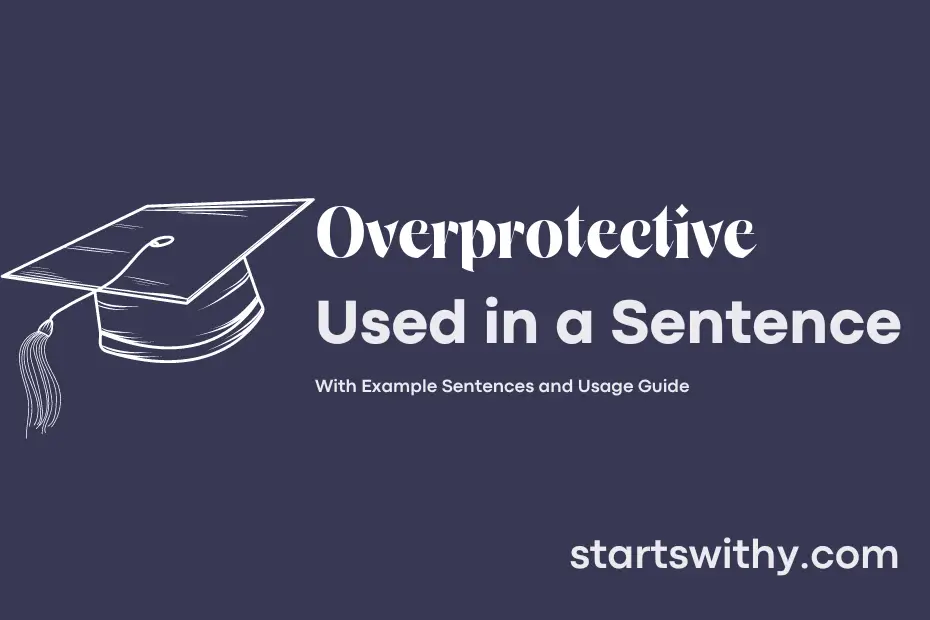Have you ever been accused of being overprotective? Being overprotective means excessively safeguarding or caring for someone to the point of restricting their freedom or hindering their growth. Parents, friends, or partners who are labeled as overprotective may have good intentions to shield their loved ones from harm, but they may unknowingly stifle independence and self-confidence.
These individuals often struggle to strike a balance between providing care and allowing space for personal development. Recognizing signs of being overprotective and learning healthy ways to support without controlling are crucial in maintaining strong and positive relationships.
7 Examples Of Overprotective Used In a Sentence For Kids
- “My mom is always * overprotective * and makes sure I wear my helmet when I ride my bicycle.”
- “Parents can be * overprotective * because they want to keep their children safe.”
- “It’s important to listen to * overprotective * adults who are trying to help us stay safe.”
- “Sometimes, being * overprotective * can be a good thing because it shows someone cares about us.”
- “We should thank our * overprotective * loved ones for looking out for us and keeping us safe.”
- “Even though my dad is * overprotective *, I know he just wants me to be safe.”
- “When someone is being * overprotective *, we should try to understand that it comes from a place of love.”
14 Sentences with Overprotective Examples
- Overprotective parents often monitor their children’s social media accounts to ensure their safety.
- Some overprotective friends may constantly check in on you to know your whereabouts.
- Overprotective professors may not allow students to take risks in their projects for fear of failure.
- Students may feel suffocated by their overprotective roommates who constantly invade their privacy.
- Some students may find it challenging to make decisions on their own due to their overprotective upbringing.
- Overprotective classmates may discourage others from exploring new opportunities for fear of failure.
- An overprotective sibling may intervene in their brother or sister’s friendships to ensure they are making the right choices.
- Overprotective guidance counselors may push students towards certain career paths instead of letting them explore their interests.
- Students may struggle with independence in college if they come from an overprotective home environment.
- An overprotective significant other may constantly question and monitor their partner’s interactions with others.
- Some students may feel smothered by their overprotective professors who micromanage every aspect of their assignments.
- Students may have difficulty establishing boundaries with their overprotective family members who want to be involved in every decision.
- A group of overprotective friends may discourage a peer from studying abroad for fear of their safety.
- Overprotective classmates may not want to work in groups for fear that others will not meet their expectations.
How To Use Overprotective in Sentences?
To properly use Overprotective in a sentence, you should be aware of its meaning and context. Overprotective refers to being excessively concerned about someone’s safety or well-being, often to the point of being controlling or restricting. Here is a guide on how to use this word effectively:
-
Identify the situation: Think about a scenario where someone is being excessively cautious or controlling towards another person. This can be a parent excessively monitoring their child’s activities or a friend being overly worried about their friend’s safety.
-
Choose your words wisely: When constructing your sentence, make sure to include the term Overprotective to convey the idea of being excessively protective. For example, “She is very overprotective of her younger sister, always watching her every move.”
-
Provide context: It’s helpful to provide additional information in your sentence to clarify why someone is being Overprotective. This can give a better understanding of the situation and why the behavior is considered excessive.
-
Use examples: Incorporating examples in your sentence can help illustrate the concept of Overprotective. For instance, “The coach was so overprotective of his star player that he wouldn’t even let him participate in practice drills.”
By following these guidelines, you can effectively incorporate the word Overprotective into your sentences to convey the idea of being excessively cautious or controlling.
Conclusion
Overall, the examples of sentences with the keyword “overprotective” demonstrate situations where an individual is excessively concerned about the safety and well-being of someone else. These sentences highlight the negative impact of being overprotective, such as restricting one’s freedom and hindering personal growth and independence. It is important to strike a balance between caring for others and allowing them the space to learn and make their own choices.
Recognizing the signs of being overprotective can help individuals adjust their behavior to foster healthier and more respectful relationships. By being mindful of the boundaries between care and control, we can promote trust, autonomy, and mutual respect in our interactions with others. This awareness can lead to more fulfilling and harmonious relationships based on respect for individual agency and personal growth.



